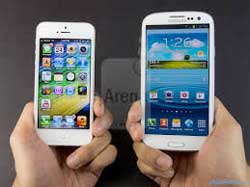
Biometric fingerprinting is seen as an option that could replace the traditional password for logging in to e-mail, social media, online banking and even online shopping stores. The password is becoming archaic and it is becoming difficult for consumers to remember a different password for different accounts.
A biometric alternative could also help to prevent credit and debit card fraud as most cybercrime is geared towards stealing personal information for illegal financial gain.
Online shopping is a global consumer trend and it is expected that affordable tablets and smartphones will accelerate the uptake of the service. Internet group Naspers, for example, has identified the e-commerce sector as one of its growth areas and said last month it would focus on growing its e-commerce business.
"Biometric fingerprint authentication technology has found its way into laptops, external hard drives and electronic wallets, and will be used in the e-commerce environment in future as a quick means to make online purchases," says Leps. He says it will soon become standard for local online retail platforms' point of sale process.
Biometric identification is already being used by some companies for employees to gain access to the workplace and is expected to become standard practice.
Leps explains that the technology consists of biometric sensors, processors, algorithms and modules that can be used separately or in combination. For mobile phones, the process starts by scanning a fingerprint either on a compatible mobile phone touchscreen device or via a USB fingerprint scanner.
When making a purchase, no image of a fingerprint will be saved. The image and certain points are encrypted and then become a series of numbers which are used for verification when purchasing.

"The algorithm cannot be reconverted to an image and therefore cannot be stolen and duplicated, nor can it be reverse-engineered to reconstruct personal information."
In its 2014 technology trends predictions, Ericsson states that websites are demanding longer passwords with a mixture of numbers, letters and symbols, which are almost impossible to remember, and that this is leading to growing interest in biometric alternatives.
Ericsson research has found that 52% of smartphone users want to use their fingerprints instead of passwords and 48% are interested in using eye-recognition to unlock their screens. A total of 74% believe that biometric smartphones will become mainstream this year.
Samsung has entered into a collaboration with PayPal through which consumers who have the Galaxy S5 use their fingerprint password to buy goods online and make mobile payments via PayPal merchants. PayPal says this introduces a new level of convenience for consumers compared with the familiar login and password.
Commenting on the PayPal/Samsung deal, Eden Zoller, Principal Analyst at research consultancy Ovum, says: "Consumers already worried about the security of established m-payment [mobile payment] mechanisms are likely to view a new technology and process with suspicion and would need convincing."
In SA, the Protection of Personal Information Act requires companies to take steps to protect confidential personal information, which may include biometric information, physical information, private correspondence and historical data.
Research firm Gartner says user expectations of a clean and simple mobile user experience often outweigh security concerns, and the same valuable data guarded by complex passwords and security measures on PCs can be left vulnerable on mobile devices. Gartner predicts that by 2016, 30% of organisations will use biometric authentication on mobile devices, up from the current 5%.
"Mobile users staunchly resist authentication methods that were tolerable on PCs and are still needed to bolster secure access on mobile devices," says Gartner Research Vice-President Ant Allan.
Source: Financial Mail via I-Net Bridge

For more than two decades, I-Net Bridge has been one of South Africa’s preferred electronic providers of innovative solutions, data of the highest calibre, reliable platforms and excellent supporting systems. Our products include workstations, web applications and data feeds packaged with in-depth news and powerful analytical tools empowering clients to make meaningful decisions.
We pride ourselves on our wide variety of in-house skills, encompassing multiple platforms and applications. These skills enable us to not only function as a first class facility, but also design, implement and support all our client needs at a level that confirms I-Net Bridge a leader in its field.
Go to: http://www.inet.co.za